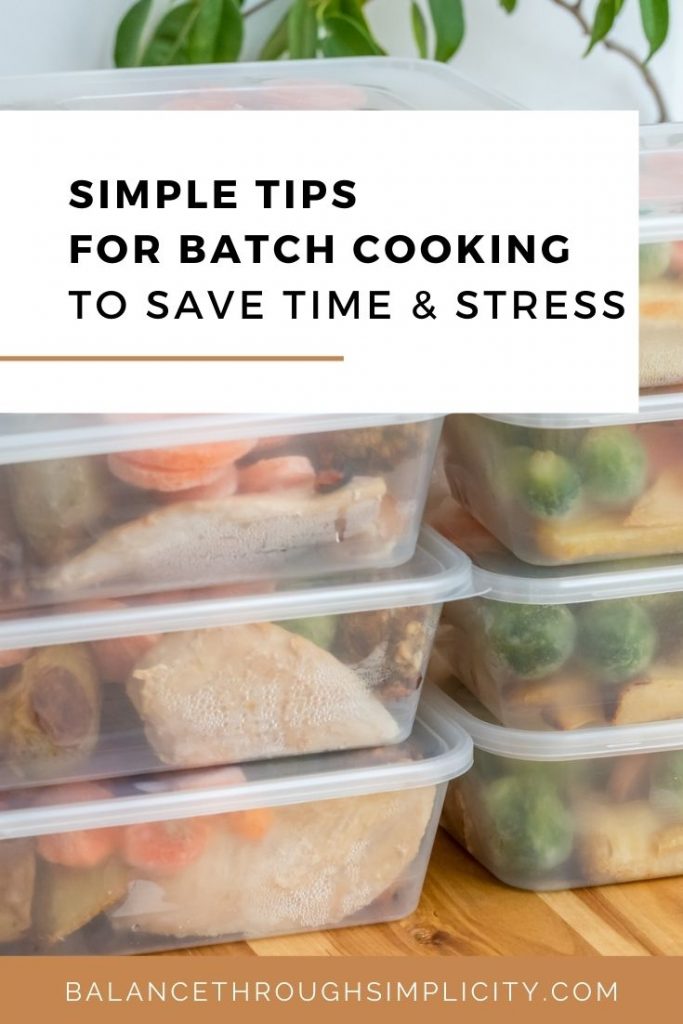SIMPLE TIPS FOR BATCH COOKING TO SAVE YOU TIME AND STRESS
Batch cooking is a wonderful way of creating healthy, cost-effective meals. Check out this post for some simple tips for batch cooking and how it can save you time and stress in the kitchen!
HOW BATCH COOKING CAN MAKE LIFE EASIER
I use batch cooking as a way of saving myself time and stress in the kitchen. It’s about preparing meals in larger quantities that you can then use over the coming weeks rather than cooking every meal from scratch.
This means that I can make a load of meals, pop them in the freezer and pull them out when I need them. I’ve always got something to hand if I’m running short on time, motivation or energy!
When I haven’t got much time in the evening, juggling homework and after-school activities, having a meal that’s pretty much ready apart from popping in the oven saves me a lot of time and stress! It’s also a quick lunchtime alternative to yet more sandwiches!
Often, the meals I’ve prepared are cheaper than buying pre-made from the shops and they’re likely to be healthier than the shop-made options or the take away menu!
I use the freezer a lot when it comes to storing my batch food. Depending on the recipe, like cottage pie or lasagne, I’ll either get to the stage just before it goes in the oven, then freeze it to be cooked through when I need it. Or, like stews and curries, I’ll cook it thoroughly then leave it to cool completely before popping it in the freezer.

BATCH COOKING TIPS
Here are some other batch cooking tips which you might find helpful. It’s not a comprehensive list but just a few tips I’ve picked up along the way and find useful myself.
- Have a plan. Identify 1-5 recipes you want to cook, choose and buy the ingredients in advance (see my post on meal-planning for help with this) so you have everything you need. It’s really annoying to run out of something half way through cooking!
- I tend not to make large quantities of weird and wonderful recipes that I’m not sure my family will eat. I keep to our old favourites which I know will go down well and won’t be wasted.
- Don’t forget to multiply all the ingredients if you’re following a recipe and making up in bulk. That being said, sometimes I bulk out meals by adding in extra vegetables rather than meat.
- After cooking, always let your food cool down to room temperature then freeze it immediately to prevent bacteria growth.
- Think whether you need to freeze things in individual portions or in dishes big enough to feed your family for dinner for example.
- Go for re-usable food bags, if possible, which take up less space than containers.
- Take as much excess air out of the bag as possible or your food will get ‘freezer burn’.
- Use oven-proof containers if you have the space in your freezer so you can put them in the oven without having to transfer to another dish first.
- Label everything to indicate what the food is, when it was frozen and any special cooking instructions, as you’re likely to forget when you come round to using it!
- Always safely defrost your food.
- Check what can actually be frozen!
- Check food is cooked/re-heated properly.
- If you’re following a recipe, always check instructions for freezing and re-heating.
BATCH COOKING RECIPES
I’m definitely not a chef so to get you started with some ideas for batch cooking, you might like to look on the internet for recipes. This is where Pinterest is brilliant for ideas and inspiration on batch-cooking recipes.
FURTHER READING
Here are some other posts which you might find helpful:
SHARE YOUR THOUGHTS
If you have any extra tips to share on batch cooking, please leave a comment below! I’d love to hear from you!

